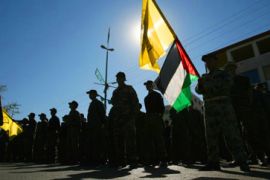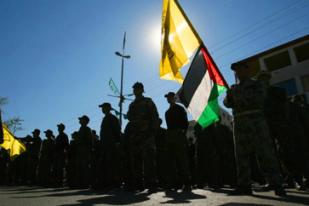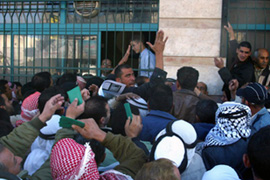Palestinians seek security abroad
Conditions in the occupied territories have led many to consider emigrating.

 |
| Growing unease in the occupied territories has led many Palestinians to consider heading abroad |
Imad Hassan, a Palestinian electronics engineer and lecturer, never thought he would want to leave his homeland.
But now, Israeli raids, political in-fighting and lawlessness have prompted Hassan to look into emigrating. Canada is his favoured destination.
“I have been holding on to my country. Not anymore,” said Hassan, a 35-year-old father of two from the West Bank city of Ramallah.
“It is not just the [Israeli] occupation but because we have lost our sense of personal security. It’s not safe for my wife to go shopping in Ramallah.”
Hassan is not the only Palestinian to consider leaving the territory. Ahmed Soboh, deputy foreign minister, said in October that 10,000 Palestinians had left since June, while 45,000 others had applied to leave.
Many educated Palestinians packed their bags after the beginning of the second Palestinian intifada [uprising] against Israel’s presence in the occupied territories in 2000.
Sanctions
Some officials say the pace of emigration picked up when Hamas took office in March this year and the West imposed crippling economic sanctions over the group’s refusal to recognise Israel and renounce violence.
Israeli trade restrictions on the occupied territories have also arrested hopes of promoting and maintaining a steady economy that would benefit Palestinians.
 |
| Government works have not been paid wages since September |
Furthermore, the capture of an Israeli soldier in a cross-border raid by fighters in June triggered an Israeli offensive in Gaza which has killed more than 370 Palestinians, about half of them civilians.
A poll published by the An-Najah University in the West Bank city of Nablus this month found one in three Palestinians wanted to emigrate.
The 1,350 people surveyed in the West Bank and Gaza Strip cited dire economic conditions as the first reason, followed by lawlessness, political deadlock and fears of civil war.
Brain drain
Ali Jarbawi, a political analyst, said the departure of educated Palestinians created a vulnerable society.
“Our situation is like an egg. If the shell is gone, then what’s the importance of the content of the egg?” he said.
About 3.8 million Palestinians live in the Gaza Strip and West Bank.
| Migration facts |
|
There are an estimated 191 million migrants worldwide in 2005, up from 176 million in 2000.
Migrants comprise 3 per cent of the global population.
The number of the migrants worldwide would constitute the fifth most populous country in the world.
Women accounted for 49.6 per cent of global migrants in 2005.
In 2005, remittance flows are estimated to have exceeded $233 billion worldwide, $167 billion of which went to developing countries.
There are roughly 30 to 40 million unauthorised migrants worldwide, comprising around 15 to 20 percent of the world’s immigrant stock.
There are between seven and eight million undocumented migrants in Europe.
According to 2005 estimates, the US hosts 10.3 million undocumented migrants. Approximately 500,000 arrive each year.
The US has the largest absolute number of irregular immigrants, which make up about 30 per cent of its total foreign-born population.
Seventy-five per cent of all international migrants are in 12 per cent of all countries.
Facts from the International Organisation of Migration |
Hamas’s rise to power sparked a power struggle with the once dominant Fatah of Mahmoud Abbas, the current Palestinian president. Both sides are trying to forge a unity government, but so far to no tangible effect.
Fawzi Barhoum, a Hamas spokesman, said the exodus of educated professionals began before they assumed power.
“It is clear that when there is no political, economic or security stability these people will look elsewhere to be creative and productive,” Barhoum said.
“The current government should not shoulder the blame for the brain drain. It is not imposing the siege.”
Emigration inquiries
Several foreign embassies in Israel as well as diplomatic missions in Ramallah said there had been a rise in Palestinians approaching them about emigration.
“We used to get an average of one or two inquiries [a day] but we are getting more than seven inquiries these days,” said one foreign official in Ramallah who declined to be identified.
Last month, police in Gaza said they had seized 1,200 forged immigration visas for Europe.
The establishment of the Palestinian Authority [PA] in 1994 after the signing of the Oslo peace accords was advantageous to educated Palestinians in Gaza and the West Bank, but optimism has waned.
The World Bank said in September that Israeli restrictions and the Western sanctions could make 2006 the worst economic year since the PA was set up.
The bank estimated growth per capita in the Palestinian territories would fall by 27 per cent in 2006 from last year.
“In each major event in Palestine, such as previous wars and then the intifada, a very professional segment of the population leave,” said Nabil Abu Rdainah, a senior Abbas aide.
“This has a negative impact on building the future state.”
Unemployment
Government workers have been on strike over unpaid wages since September, although teachers went back to work this month, and daily life has largely come to a standstill.
 |
| The conflict and the resultant bloodshed have scarred Palestinian children |
Many of the 165,000 state workers have joined non-governmental organisations in the Palestinian territories, gone to rich Gulf states or sought emigrating after going unpaid for weeks following the Western sanctions.
“If this continues there will be a huge problem,” said Mohammad Shtayyeh, a former public works minister. The ministry’s two best civil engineers have gone to work in the Gulf.
With rising unemployment, a feature of Palestinian life at present, crime has risen, police say.
Adnan al-Dumeiri, police spokesman in the West Bank, said 11 Palestinians were killed there in criminal violence in October compared to three people in May.
Abu Ahmad, a senior banker, recently applied to emigrate to Canada to give his three children a better future.
“The kids need to live an ordinary life, without militants and without Israeli army raids,” said Ahmad, from Nablus, scene of frequent clashes with Israeli soldiers and an incubator for Palestinian fighters.
Another Palestinian, who declined to give his name because he said it might affect his chance of moving to Canada, is well established in Ramallah, has a nice apartment and a good job.
He decided to leave after two of his children were nearly killed when fighters started shooting in protest after Israeli soldiers killed one of their brothers in arms.
“I want my kids to live in a civil society, not a shooting one,” he said. “Here there is no protection. The police cannot even organise the traffic.”
The International Organisation of Migration observes December 18 as the International Migrants Day. Migration is one of the defining issues of the twenty-first century. It is now an essential, inevitable and potentially beneficial component of the economic and social life of every country and region.